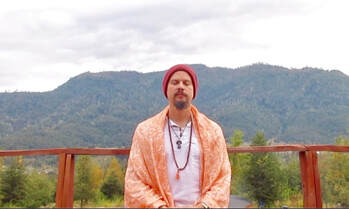|
I was asked recently by one of my current meditation students if he could start teaching meditation at the end of his yoga classes. He has only been practicing meditation for two months. I had to explain to him that I had to spend five years meditating and studying closely with my Guru in his ashram before he gave me permission to begin teaching meditation. During this time, I was expected to meditate twice a day everyday using the techniques that my Guru had taught me. It was difficult for me to adhere to this disciplined practice because I was in my late twenties/early thirties at the time. Usually, at this age most people are far more concerned with their career, spending time with friends, buying a house, and starting a family. My only priority at the time was awakening spiritually and taking advantage of the fact that I had regular access to an enlightened being.
I also recently saw an advertisement on social media for a meditation workshop being offered by someone who I know for a fact does not meditate regularly. In fact, this person recently told me that he only meditates a few times a month. Furthermore, without being judgmental, I know this person uses drugs and drinks alcohol on an almost daily basis. When we meditate daily with discipline, we soon begin to experience peace and contentment and have no desire to use drugs or drink alcohol. One who is peaceful and happy has no desire to change their state of consciousness via chemicals. My Guru told me that in his estimation approximately 90% of the people teaching meditation should not be teaching it. He taught me that it was of the utmost importance for a meditation teacher to have ample experience with all of the various refined states of superconsciousness. Otherwise, as Jesus said, "It is the blind leading the blind." How can one expect to guide their students to superconscious states or Samadhi states if they have never experienced them? Many mistakenly assume that teaching meditation is a lot like teaching asana or pranayama...it is not. Last week, I was rereading the Hatha Yoga Pradipika and the final verse caught my attention. It lists three qualifications for a true Guru. 1. The Prana of the Guru is flowing freely in the Sushumna Nadi regularly. 2. The brain of the Guru is producing Soma/Amrita regularly. 3. The Guru can enter into superconscious states at will. Ideally, all meditation teachers would meet this criteria. My Guru certainly did, along with a handful of his advanced disciples who studied closely with him. Sadly, I am observing that there are many people teaching meditation who are not ready to teach it. I am not being judgmental. I am simply observing this vexing trend from a place of dispassionate objectivity. If one has no experience with enlightened states of consciousness, they should not be attempting to guide others towards enlightened states of consciousness via the practice of meditation. It is like someone who is not a brain surgeon attempting to teach someone how to perform brain surgery...it's dangerous and irresponsible. OM. PEACE. AMEN. Español Uno de mis estudiantes de meditación actual me preguntó recientemente si podía comenzar a enseñar meditación al final de sus clases de yoga. Solo ha estado practicando meditación durante dos meses. Tenía que explicarle que tenía que pasar cinco años meditando y estudiando de cerca con mi Guru en su ashram antes de que me diera permiso para comenzar a enseñar meditación. Durante este tiempo, se esperaba que meditara dos veces al día todos los días usando las técnicas que mi Guru me había enseñado. Fue difícil para mí adherirme a esta práctica disciplinada porque tenía entre 20 y 30 años en ese momento. Por lo general, a esta edad, la mayoría de las personas están mucho más preocupadas por su carrera, por pasar tiempo con amigos, comprar una casa y formar una familia. Mi única prioridad en ese momento era despertar espiritualmente y aprovechar el hecho de que tenía acceso regular a un ser iluminado. Recientemente, también vi un anuncio en las redes sociales sobre un taller de meditación ofrecido por alguien que, de hecho, no medita regularmente. De hecho, esta persona me dijo recientemente que solo medita unas pocas veces al mes. Además, sin ser crítico, sé que esta persona usa drogas y bebe alcohol casi a diario. Cuando meditamos diariamente con disciplina, pronto comenzamos a experimentar paz y satisfacción y no deseamos usar drogas o beber alcohol. Quien es pacífico y feliz no desea cambiar su estado de conciencia mediante productos químicos. Mi gurú me dijo que, en su opinión, aproximadamente el 90% de las personas que enseñan meditación no deberían estar enseñándola. Me enseñó que era de suma importancia para un maestro de meditación tener una amplia experiencia con todos los diversos estados refinados de la superconciencia. De lo contrario, como dijo Jesús, "es el ciego guiando al ciego". ¿Cómo se puede esperar guiar a sus estudiantes a estados superconscientes y / o estados Samadhi si nunca los han experimentado? Muchos asumen erróneamente que enseñar meditación es muy parecido a enseñar asana o pranayama ... no lo es. La semana pasada, estaba releyendo el Hatha Yoga Pradipika y el verso final me llamó la atención. Enumera tres calificaciones para un verdadero Guru. 1. El Prana del Guru fluye libremente en el Sushumna Nadi regularmente. 2. El cerebro del Guru está produciendo Soma / Amrita regularmente. 3. El Gurú puede entrar en estados superconscientes a voluntad. Idealmente, todos los maestros de meditación cumplirían con este criterio. Mi Guru ciertamente lo hizo, junto con un puñado de sus discípulos avanzados que estudiaron de cerca con él. Lamentablemente, estoy observando que hay muchas personas que enseñan meditación que no están listas para enseñarla. No estoy siendo crítico. Simplemente estoy observando esta tendencia interesante desde un lugar de objetividad desapasionada. Si uno no tiene experiencia con estados de conciencia iluminados, no debería intentar guiar a otros hacia estados de conciencia iluminados a través de la práctica de la meditación. Es como alguien que no es un cirujano cerebral tratando de enseñarle a alguien cómo realizar una cirugía cerebral ... es peligroso e irresponsable. OM PAZ AMÉN.
0 Comments
Leave a Reply. |
Autor
Christopher Sartain es profesor de Yoga y meditación y autor en Chile. Archivos
September 2022
Categorias
|


 RSS Feed
RSS Feed
